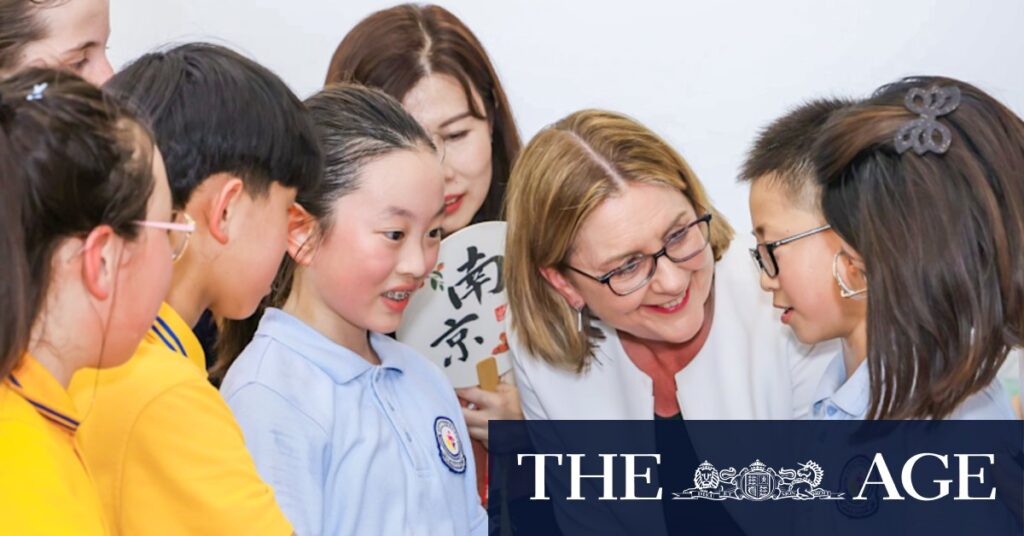
At the conclusion of a significant diplomatic visit to China, Victorian Premier Jacinta Allan has acknowledged the necessity for domestic improvements to ensure the success of a newly forged agreement aimed at boosting student exchanges between Victoria and China. This agreement, made with Beijing’s education minister, underscores the importance of international education as a cornerstone of the future relationship between the two countries.
During her meeting with Huai Jinpeng in Beijing, Allan emphasized that international education represents “the truest form of securing the future” for nations that are economically intertwined yet geopolitically divergent. She highlighted the role of education in fostering mutual understanding, trust, and friendship, which are essential for global security.
“When you have got kids learning language and culture, through education opportunities, they are building trust, they are building collegiality, they are building friendship that are going to provide a more secure world into the future because they understand one another,” Allan told The Age shortly before flying back to Melbourne.
Challenges and Opportunities in International Education
Allan acknowledged that for international education to effectively reshape the Australia-China relationship, it requires more than just an influx of Chinese students. The quality of education and the experience offered by Victorian universities and TAFEs must meet the expectations set forth in their promotional efforts.
The Victorian branch of the National Tertiary Education Union (NTEU) has garnered support from several Labor MPs, including state Education Minister and Deputy Premier Ben Carroll, for legislative reforms aimed at restructuring university councils. These changes are intended to enhance the delivery of courses for both domestic and international students.
Allan, while not yet briefed on the proposed reforms, expressed support for increasing student and staff representation in university governance, aligning with her belief in the importance of diverse voices in decision-making processes.
“I have said repeatedly that you get the best outcome when you listen to people, listen and hear their experience, and recognize that you have the opportunity and responsibility to act,” she stated.
Reforming University Governance
The push for reform in university governance has gained momentum as a national campaign by the NTEU, coinciding with a Senate inquiry into current appointment practices. These practices have often favored individuals with political and business backgrounds, driven by the need for increased revenue.
Professor Joo-Cheong Tham of Melbourne Law School, an NTEU state assistant secretary, has been a vocal advocate for change. He argues that universities must rethink their approach to international education to ensure a balanced and enriching experience for all students.
“The time is overdue for a reset,” he says. “The social licence of universities is at its lowest ebb during the time of my career. They can’t effectively advocate for international students when they are perceived, rightly or wrongly, of being gold diggers.”
Carroll confirmed his support for the NTEU’s call for governance reform, emphasizing the importance of setting high standards for international students’ experiences in Victoria.
“International students give far more than they receive, and the Victorian government has a role to play in setting the standards for their experience,” he says.
Addressing Past Challenges and Looking Forward
The treatment of international students in Australia reached a low point in April 2020, when then-Prime Minister Scott Morrison suggested that foreign students unable to support themselves during the COVID-19 lockdown should return home. Allan noted that this decision had a lasting impact, yet she also highlighted the gratitude expressed by Huai for the support provided to Chinese students in Melbourne during the pandemic.
Allan pointed to Wu Chun, a former boy band member and television actor, as a success story of international study. Wu, who studied at RMIT for six years, is now a brand ambassador for Victoria’s new tourism campaign focused on China.
However, not all international students share such positive experiences. A study published by the Journal of Mental Health highlighted the mental health challenges faced by international students, advocating for better support systems and more integration strategies.
Allan believes that closer collaboration between Victorian and Chinese universities could be a way forward. During her trip, she witnessed the signing of an agreement between RMIT and the Shanghai University of International Business and Economics to establish a joint institute.
The future of international education in Victoria hinges on the successful implementation of these initiatives and reforms, which aim to create a more inclusive and high-quality educational environment for all students.







